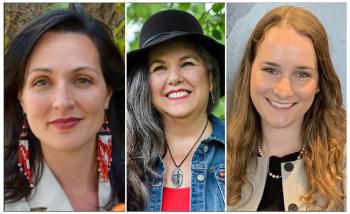Image Caption
Summary
Local Journalism Initiative Reporter
Windspeaker.com
Indigenous women with experience in the legal system gathered Tuesday afternoon for a virtual forum on gender justice. Words from the National Inquiry into Murdered and Missing Indigenous Women and Girls final report strongly guided the discussion.
Alana Robert, a Manitoba Métis lawyer with McCarthy Tetrault, said the MMIWG report asserts that “colonial violence, racism and oppression” connects the fate of Indigenous women, girls and two-spirited people.
“I think each of these factors of colonial violence, racism, and oppression can permeate throughout the legal system, and it situates our role as lawyers to practise in a way that safeguards against this as much as possible,” said Robert, speaking about how knowledge of the colonial legal system could be optimized to bring about change.
Robert was one of four women to speak on a panel on the Legal System and Justice for Indigenous Women, Girls, and 2SLGBTQQIA Persons. It was a component of a three-part series on the Gender Justice Now symposium organized by the Women’s Legal Education and Action Fund (LEAF).
“The ability of the legal system to perpetrate harm and trauma is no secret,” said Robert, referencing the violent death of Cindy Gladue and the legal proceedings that followed.
Gladue was killed in an Edmonton hotel room. As evidence during the trial of her alleged killer, a preserved part of Gladue’s body was brought into court, further traumatizing her family.
Robert said both the MMIWG national inquiry and the Truth and Reconciliation Commission on Indian Residential Schools said the legal system needed to be more culturally competent.
Specifically, MMIWG national inquiry Calls for Justice 15.7 calls for space to be created “for relationships based on respect as human beings” in which respect, kindness and love is demonstrated.
“(There is) something so humanizing about this call… It guides us to reflect on how we can practise law, approach relationships based on these principles and encourage others to do the same,” said Robert.
Until that is done, girls like 15-year-old Roderica Ribbonleg from Little Red River Cree Nation in northern Alberta will continue to be lost. Her body was found in a forested area this past July and a man charged in her death.
“It tragically symbolizes the consequences of what happens when we maintain the status quo,” said Robert.
“There is no shortage of ignorance and racism in the legal profession, and I think we need to recognize it. We need to call it for what it is.”
Naiomi Metallic from the Listuguj Mi’gmaq First Nation in Gespe’gewa’gi is assistant professor at the Schulich School of Law at Dalhousie University. She also referenced the Calls for Justice, calling for the creation of a national Indigenous human rights ombudsperson and national Indigenous human rights tribunal.
As it stands now, said Metallic, a dispute in a Jordan’s Principle case would see a family have to take up the cause with the Canadian Human Rights Commission and, simultaneously, with the human rights tribunal of that province.
Jordan’s Principle was established to ensure services, such as medical treatments, for a First Nations child are not delayed due to jurisdictional debates about which government, the federal or the provincial, will pick up the costs.
A national Indigenous human rights ombudsperson and national Indigenous human rights tribunal that “had jurisdiction over both the federal and provincial government, I think, that would be fantastic,” said Metallic.
As good a ruling as Jordan’s Principle is, it still falls short, said Metallic.
“It’s a great decision … but it hasn’t resulted in Canada implementing transformative changes across the board,” she said.
Instead of proactively addressing inequality, Jordan’s Principle allows for addressing systemic discrimination after the fact, said Metallic.
Colonial law and policies have created an “arbitrary distinction” and has resulted in systemic underfunding, neglect in delivery of essential services, and inferior services offered in child welfare, social assistance, housing, water, policing and more, she said.
The system of service delivery for Indigenous people has a lack of legislation and a lack of clear standards, Metallic said.
Panelist Lynn Gehl challenged and defeated sex-based discrimination in the Indian Act. Gehl’s experience with the legal system has led her to at least one basic truth: Money makes a difference.
With her limited budget Gehl took on the Justice department with its annual budget of more than $700 million. Information Gehl garnered through the Freedom of Information Act indicated Canada had spent $1 million fighting her in court.
“I had little to no resources and I think a plaintiff needs to have money so then the relationship with their lawyer, it becomes different. They have a little bit more agency, because they’re paying the lawyer,” said Gehl.
For the legal system to make a difference, people need to “follow the turtle,” Gehl said.
“If we want social justice, if we want equality for all, then we have to stand behind the most oppressed person, the slowest person and push them forward,” she said.
She adds this must be undertaken by Indigenous people and allies.
“When the slowest is liberated, then we will all be liberated,” said Gehl.
Joining the panel was Beth Kotierk, originally from Igloolik, Nunavut. She is currently a lawyer at Maliiganik Tukisiiniakvik (Legal Services Board of Nunavut).
The panel was moderated by Breanne Lavallée-Heckert, a Métis woman from Red River, currently a graduate student pursuing a Master of Laws at McGill University. She is a member of LEAF National’s Board of Directors.
Local Journalism Initiative Reporters are supported by a financial contribution made by the Government of Canada.

